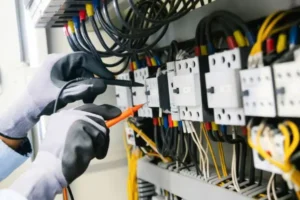Best Electrical Engineer Online Courses And How to Apply
If you’re looking to pursue a career in electrical engineering, online courses are a convenient and flexible way to gain the necessary skills and knowledge.
Advertising
Some of the best platforms for electrical engineering courses include Coursera, edX, and Udemy, offering courses from top universities and institutions, explore now and learn how to apply step-by-step to boost your career.
How to Apply for Electrical Engineering Online Courses
Enrolling in an online course is a simple process. Here’s a detailed step-by-step guide:
- Choose the Right Platform
- Explore reputable platforms like Coursera, edX, Udemy, and FutureLearn.
- Compare course content, ratings, and instructors.
- Register and Create an Account
- Sign up using your email or link your social media account.
- Verify your email to activate your profile.
- Search and Enroll
- Search for “Electrical Engineer Online Courses.”
- Click “Enroll Now” and choose your payment option or free trial if available.
- Access Learning Materials
- Once enrolled, access video lectures, notes, and downloadable assignments.
- Join interactive discussion forums to ask questions and share insights.
- Complete Assessments and Earn Your Certificate
- Pass quizzes, submit projects, and complete assignments.
- Download your certificate and share it on LinkedIn to showcase your accomplishment.

Why Take an Electrical Engineer Online Course?
Electrical engineer online courses offer a unique blend of convenience, in-depth content, and hands-on experiences that make them an appealing option for learners at all levels.
Below, we explore the top reasons why taking an online electrical engineering course is worth your time and investment.
Flexibility and Accessibility
One of the standout features of online courses is their flexibility. Unlike traditional classes, these programs allow you to learn at your own pace, making them ideal for working professionals and students with busy schedules.
- Self-Paced Learning: You can set your own study hours and complete lessons at your convenience.
- Global Access: All you need is an internet connection to access lectures, assignments, and resources from anywhere.
Comprehensive Curriculum
Online courses cover a broad spectrum of topics, from basic circuit theory to advanced control systems and IoT integration. This ensures that learners gain a solid foundation as well as specialized knowledge.
- Foundational Topics: Circuit analysis, power systems, and electromagnetism.
- Advanced Modules: Smart grids, renewable energy, and embedded systems.
- Interactive Projects: Many programs include virtual labs and capstone projects to reinforce learning.
Career Advancement
Completing an online electrical engineering course can significantly boost your resume and enhance your professional profile.
- Industry-Recognized Certifications: Many courses provide certificates that are valued by employers.
- Increased Job Opportunities: Skills learned through these courses open doors in fields like energy, telecommunications, and automation.
- Higher Earning Potential: Certified professionals often command higher salaries and better job security.
Up-to-Date Content
The curriculum of reputable online courses is often updated to reflect industry trends and technological advancements.
- Modern Technologies: Learn about smart systems, renewable energy innovations, and digital automation.
- Real-World Applications: Courses often feature case studies and examples from current industry practices.
Cost-Effective Learning
Compared to traditional degree programs, online courses tend to be more affordable.
- Free Trials and Discounts: Many platforms offer trial periods and promotions.
- Financial Aid: Scholarships and installment plans make learning more accessible.
Networking and Community
Online courses often include forums and discussion groups where learners can connect with peers and instructors.
- Collaborative Learning: Share insights, solve problems together, and build a professional network.
- Expert Access: Many courses include live Q&A sessions with industry experts.
Top 5 Electrical Engineer Online Courses
Choosing the right online electrical engineering course can significantly impact your learning experience and career growth. To help you make an informed decision, here are the top five electrical engineer online courses known for their comprehensive content, expert instruction, and industry recognition.
1. Electrical Engineering Fundamentals by Coursera
- Provider: University of Colorado Boulder
- Duration: 10 weeks (self-paced)
- Key Topics: Circuit theory, electromagnetism, digital systems.
- Certificate: Yes
Why Choose This Course: This course is ideal for beginners who want to build a solid foundation in electrical engineering. It includes interactive exercises and real-world examples that make complex concepts more accessible. The self-paced format allows learners to manage their study schedules while mastering essential topics.
2. Power Systems Specialization by edX
- Provider: Massachusetts Institute of Technology (MIT)
- Duration: 12 weeks
- Key Topics: Power grids, renewable energy, power electronics.
- Certificate: Verified by MIT
Why Choose This Course: This specialization dives deep into the analysis and design of power systems. It covers everything from traditional energy distribution to modern smart grids and renewable energy integration. Case studies and simulation tools provide hands-on experience that is highly valued by employers.
3. IoT and Embedded Systems Course by Udemy
- Provider: Udemy
- Duration: 6 weeks
- Key Topics: Microcontrollers, IoT frameworks, real-time systems.
- Certificate: Yes
Why Choose This Course: Perfect for those who want to specialize in embedded systems and Internet of Things (IoT) technology. This course offers detailed tutorials on building IoT devices and includes downloadable projects that learners can implement to strengthen their practical knowledge.
4. Renewable Energy in Electrical Engineering by FutureLearn
- Provider: Delft University of Technology
- Duration: 8 weeks
- Key Topics: Solar power, wind energy, hybrid systems, energy storage.
- Certificate: Yes
Why Choose This Course: Focused on sustainable energy solutions, this course equips learners with knowledge about renewable energy technologies and their real-world applications. It emphasizes how electrical engineers can contribute to building a more sustainable future.
5. Control Systems and Automation by LinkedIn Learning
- Provider: LinkedIn Learning
- Duration: 5 weeks (self-paced)
- Key Topics: Automation, feedback loops, process control.
- Certificate: Yes
Why Choose This Course: This course is designed for those looking to gain expertise in automation and control systems. It covers both theoretical concepts and practical applications, providing learners with the tools needed to implement automation solutions in industrial settings.
Course Content Overview
Core Learning Areas:
- Circuit Analysis: Explore resistors, capacitors, and inductors and learn how they operate within electrical systems.
- Electromagnetism: Understand how electric and magnetic fields interact in devices like transformers and motors.
- Power Systems: Study the principles behind energy generation, transmission, and distribution.
- Digital Signal Processing: Learn how to analyze and manipulate electrical signals for communication systems.
- Control Systems: Dive into the theory and application of feedback loops and automation.
Advanced Topics:
- Embedded System Design: Program microcontrollers for real-world applications.
- IoT Integration: Create smart environments with connected devices.
- Smart Grids: Study the structure of intelligent power distribution systems.
- Sustainability Modules: Learn how electrical engineers contribute to reducing carbon footprints.
Practical exercises such as circuit simulations and hardware design challenges reinforce theoretical knowledge.
What Is It Like to Work as an Electrical Engineer?
Working as an electrical engineer offers a dynamic and rewarding career with opportunities across various industries such as power generation, telecommunications, manufacturing, and renewable energy.
Here, we explore the typical responsibilities, work environment, and growth prospects for electrical engineers.
Key Responsibilities
Electrical engineers play a crucial role in designing, developing, and maintaining electrical systems. Their tasks can vary depending on their specialization and the industry they work in.
- System Design: Creating blueprints and models for electrical systems, ensuring compliance with safety standards and regulations.
- Troubleshooting and Maintenance: Diagnosing and resolving issues in existing electrical systems to ensure efficiency and safety.
- Testing and Prototyping: Running simulations and tests on electrical circuits and prototypes before implementation.
- Project Management: Overseeing electrical projects from conception to completion, coordinating with other departments and stakeholders.
- Research and Development: Staying updated on the latest technologies and contributing to the innovation of new electrical solutions.
Work Environment
Electrical engineers typically work in a combination of office and field settings.
- Office Work: Tasks such as designing schematics, analyzing data, and writing reports are performed at desks.
- Field Work: Conducting inspections, supervising installations, and collaborating with technicians on-site.
Many electrical engineers work full-time, and some roles may require additional hours, especially during project deadlines or system emergencies.
Career Specializations
The field of electrical engineering offers various areas of specialization, including:
- Power Systems Engineer: Focuses on the generation, transmission, and distribution of electricity.
- Control Systems Engineer: Designs and manages systems that use automation to improve efficiency.
- Telecommunications Engineer: Works on designing and optimizing communication networks and infrastructure.
- Electronics Engineer: Specializes in creating and testing electronic devices and circuits.
- Renewable Energy Engineer: Develops sustainable energy solutions such as solar, wind, and hydroelectric systems.
Skills Required
To excel as an electrical engineer, both technical and soft skills are essential.
- Analytical Thinking: Ability to interpret complex data and diagnose system issues.
- Mathematical Proficiency: Strong foundation in math, particularly calculus and algebra, for designing and testing circuits.
- Problem-Solving: Finding innovative solutions to technical challenges.
- Communication: Collaborating effectively with cross-functional teams and presenting findings clearly.
- Attention to Detail: Ensuring designs and systems meet precise specifications and safety standards.
Growth and Opportunities
Electrical engineering is a field with strong growth potential due to advancements in technology and the increasing demand for sustainable energy.
- Advancement: Many electrical engineers move into leadership roles, such as project managers or department heads.
- Emerging Trends: Smart grids, electric vehicles, and IoT systems continue to create new opportunities.
- Global Demand: Electrical engineers are in high demand across industries worldwide, making this a highly portable career.
Challenges of the Role
While rewarding, working as an electrical engineer also comes with challenges.
- Complex Problem-Solving: Systems can be intricate, requiring time and patience to troubleshoot.
- Long Hours: Some projects may require working beyond standard hours to meet deadlines.
- Safety Risks: Engineers working on-site must adhere to strict safety protocols to avoid accidents.
Career Opportunities After Completing an Online Electrical Engineering Course
Completing an electrical engineering course opens up a wide range of career paths, including:
Common Job Roles:
- Electrical Engineer: Design, test, and maintain electrical systems.
- Power Systems Analyst: Optimize energy distribution and grid performance.
- Automation Specialist: Develop automated control processes for industrial systems.
- IoT Engineer: Build interconnected systems for smart homes, factories, and cities.
- Renewable Energy Consultant: Help organizations transition to sustainable energy solutions.
Growing Industry Trends:
- Increased demand for specialists in renewable energy.
- Expansion of smart grid technologies in metropolitan areas.
- Integration of AI-driven control systems in manufacturing.
Many graduates find that completing a well-recognized online course leads to promotions, salary increases, and exciting new projects.
Online courses of electrical engineering offer a comprehensive, cost-effective way to acquire essential skills and credentials.
With flexible schedules, engaging content, and recognized certifications, these programs can propel your career in sectors such as energy, telecommunications, and automation.
Whether you’re an aspiring engineer or an experienced professional seeking to expand your expertise, choosing the right course can open doors to exciting job opportunities.
Start your learning journey today and shape your future with knowledge and confidence.





